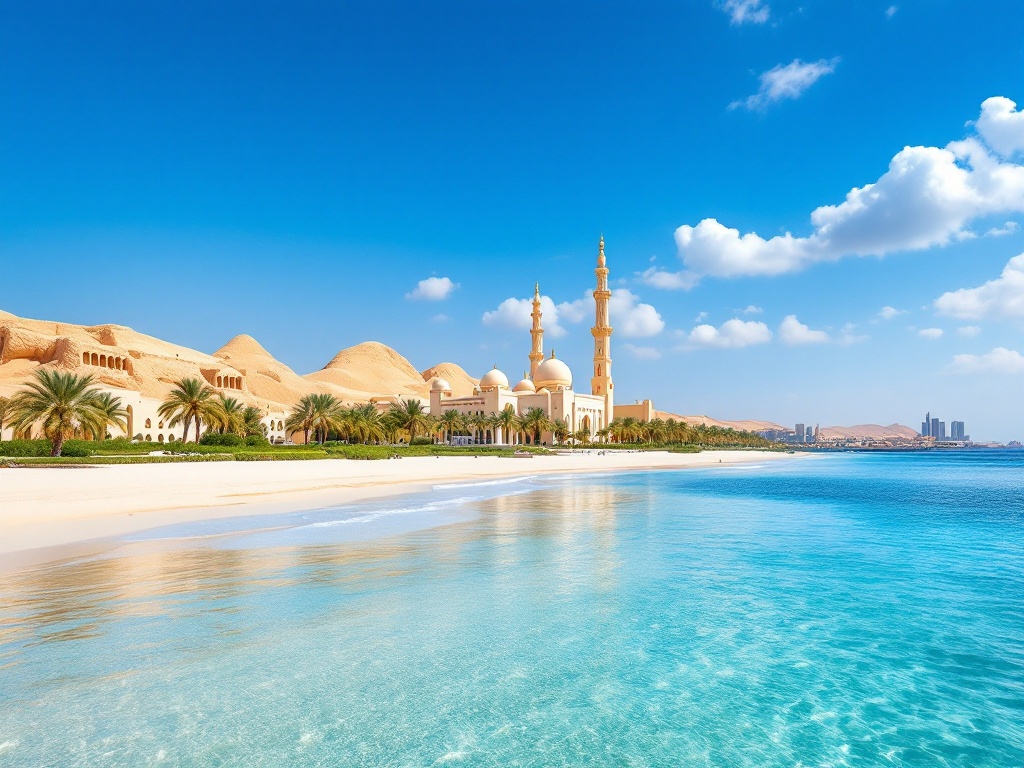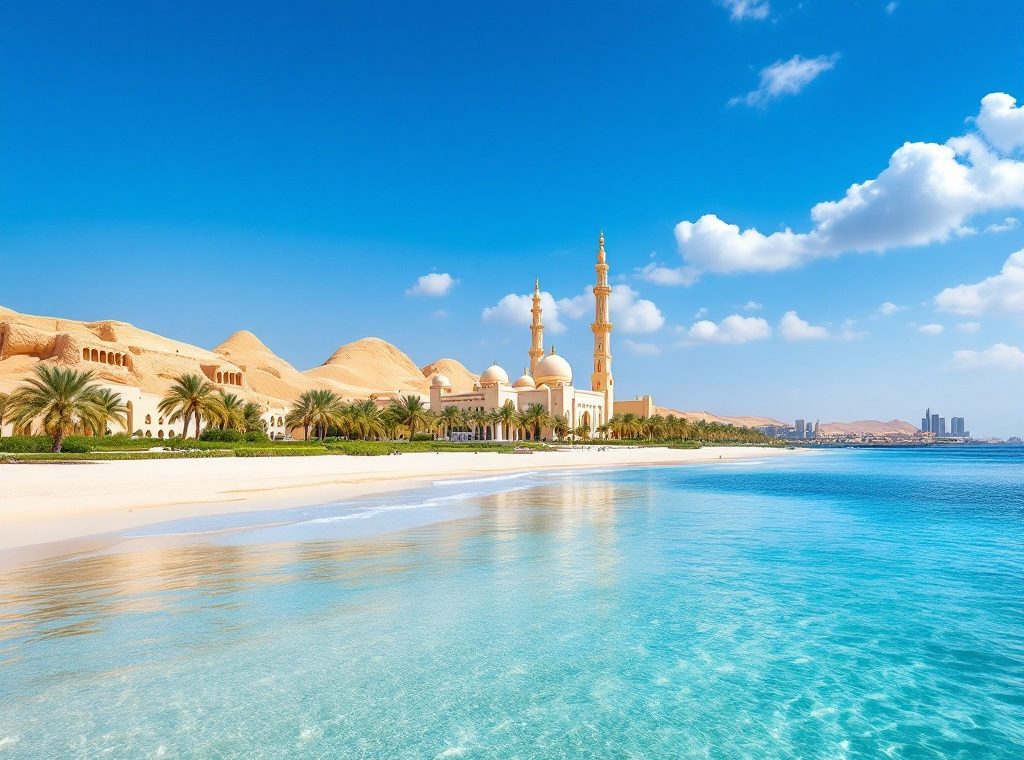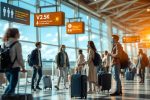What Every Traveler Should Know About Visiting Bahrain
Dreaming of pristine beaches, ancient burial mounds, and the thrill of Formula 1? Discover Bahrain, a captivating island nation in the Persian Gulf. Explore 4,000 years of history at the Bahrain National Museum, marvel at the Al Fateh Grand Mosque, and experience the unique Pearling Path, a UNESCO World Heritage site. Plan your trip between November and March for ideal weather and vibrant festivals. Learn about visa requirements, cultural etiquette, and transportation options to prepare for an unforgettable Arabian adventure. Start exploring Bahrain today!
Important information

- Most visitors need a visa. Check visa rules online as they can change. A passport valid for six months beyond your trip is a must.
- The best time to visit is November to March for pleasant weather (20-25°C).
- Dress modestly, covering shoulders and knees. During Ramadan, avoid eating, drinking, or smoking in public during daylight hours. Ask before taking photos of people.
- Bahrain uses the Bahraini Dinar (BHD). Credit cards are common, but cash is useful in markets and smaller shops. You’ll need a Type G plug adapter for electronics.
- Bahrain is safe, but usual precautions apply. For emergencies, call 999 (police), 998 (ambulance), or 997 (fire).
Introduction to Bahrain: A Unique Travel Destination
Bahrain, a small island nation nestled in the Persian Gulf between Saudi Arabia and Qatar, presents a unique travel experience. This destination boasts a rich history, vibrant culture, and warm hospitality, blending the traditional with the modern. Visitors can explore ancient archaeological sites and experience the lively souks of Manama. There’s something for everyone in this diverse and exciting locale. For those entering Malaysia, an eVisa Bahrain may be required. More information can be found at eVisa Bahrain.
Visa Requirements for Visiting Bahrain
Traveling to Bahrain? Ensure your passport is valid for at least six months beyond your departure date. Most nationalities require a visa, obtainable online (e-visa) or upon arrival. However, visa regulations can change, so confirm the latest requirements for your country before traveling. Travel insurance is recommended, and it’s wise to check necessary vaccinations and health advisories as well. Here’s a quick checklist before your trip:
- Passport Validity: Ensure your passport is valid for at least six months beyond your intended stay.
- Visa Requirements: Check the latest visa requirements for your nationality. Most nationalities need a visa, available online (e-visa) or upon arrival.
- Travel Insurance: Consider purchasing travel insurance for unforeseen circumstances.
- Health Advisories: Check for any recommended vaccinations or health advisories related to Bahrain.
Types of Visas Available
Bahrain offers various visa options to accommodate diverse travel purposes. Tourists can obtain a tourist visa for leisure and exploration. Business travelers can apply for a business visa to conduct their professional activities. Transit visas are available for those passing through Bahrain to another destination. Visa requirements differ depending on nationality and the purpose of the visit. For example, a business visa may require a letter from your employer. Processing times can also vary.
How to Obtain a Visa for Bahrain
Acquiring a Bahraini visa is generally a simple process. Applicants can often apply online or obtain one upon arrival. However, specific requirements vary depending on nationality. Ensure your passport’s validity extends at least six months beyond your intended stay. It’s also important to note that visa regulations are subject to change, so verifying the latest information before traveling is crucial.
Important Identification Requirements
When in Bahrain, keep your photo ID (e.g., passport) readily available, as local authorities may request it.
Best Time to Visit Bahrain
Bahrain truly shines from November to March. Temperatures range from a pleasant 20 to 25 degrees Celsius, making it the perfect time to discover this captivating island nation.
The comfortable weather enhances sightseeing, making every outing enjoyable. These cooler months also offer a vibrant array of festivals and events, showcasing Bahrain’s rich culture.
Climate Considerations
Bahrain’s climate is characterized by hot, desert conditions with minimal rainfall, mostly during winter. Summers are extremely hot and humid, with temperatures often exceeding 35°C (95°F) between June and September. Winters, on the other hand, are mild, averaging 20°C (68°F) from December to March. The best time to visit Bahrain is during the cooler months, from October to April, when the weather is ideal for exploring and avoids the intense summer heat.
Seasonal Events and Festivals
Bahrain pulses with activity year-round, offering a vibrant blend of sports, culture, and arts. Experience the thrill of Formula 1 at the Gulf Air Bahrain Grand Prix each spring. From October to April, the Rashid Equestrian & Horseracing Club hosts its annual racing season. Bahrain’s rich cultural heritage shines during religious holidays such as Eid al-Fitr and Eid al-Adha. The dynamic arts scene presents a continuous flow of cultural events, art exhibitions, and music festivals. Check local listings for specific dates and times to explore Bahrain’s diverse entertainment offerings.
Must-Visit Tourist Attractions in Bahrain
Visit the magnificent Al Fateh Grand Mosque, a breathtaking architectural marvel capable of accommodating over 7,000 worshippers.
Explore the Bahrain National Museum and immerse yourself in the island nation’s captivating history.
Journey through time at the Dilmun Burial Mounds, an expansive UNESCO World Heritage site and prehistoric cemetery.
Discover the fascinating Pearling Path, another UNESCO-designated site that unveils the rich story of Bahrain’s pearling heritage.
Al Fateh Grand Mosque
The Al Fateh Grand Mosque, a majestic example of Islamic architecture, dominates the Manama skyline in Bahrain. This massive structure also houses the country’s National Library.
Bahrain National Museum
The Bahrain National Museum is Bahrain’s premier cultural institution, showcasing 4,000 years of fascinating history and heritage. Visitors can explore the nation’s rich past.
Dilmun Burial Mounds
Bahrain’s Dilmun Burial Mounds comprise the world’s largest prehistoric cemetery, dating back to the Dilmun civilization (3rd to 1st millennium BC). Recognized by UNESCO for its significance, the site provides crucial insights into ancient funerary practices and social structures. Archaeologists have unearthed various burial chambers and artifacts, illuminating Dilmun beliefs and rituals.
The Pearling Path: A UNESCO World Heritage Site
Bahrain’s Pearling Path unveils a captivating tale of the nation’s rich pearling history, a heritage that profoundly shaped its economy and culture. This UNESCO World Heritage Site attracts visitors worldwide, eager to explore Bahrain’s cultural significance.
Accommodation Options in Bahrain
Bahrain offers a range of accommodation options for every traveler. Those seeking luxury can indulge in premium amenities such as spas and fine dining at high-end hotels. Budget travelers can find comfortable hostels equipped with basic necessities. For extended stays, guesthouses and serviced apartments provide a home-like experience.
Luxury Hotels
Seeking Bahraini luxury? Consider these opulent hotels:
- The Ritz-Carlton: Offers spa treatments, fine dining, and plush accommodations.
- The Four Seasons Hotel Bahrain Bay: Provides a similarly lavish experience, complete with spa treatments, fine dining, and plush accommodations.
- The Wyndham Grand Manama: Offers breathtaking views and a luxurious experience.
Budget-Friendly Hostels
Bahrain offers budget-friendly hostels for travelers seeking simple lodging. These hostels are not only easy on the wallet, but they also provide excellent opportunities to connect with other adventurers.
Alternative Lodging Choices
Serviced apartments and guesthouses offer more than just a place to sleep. They provide kitchen facilities, allowing you to prepare your own meals. Their spacious design makes them ideal for families and longer stays. Moreover, guesthouses offer a unique cultural experience, connecting you with the local community.
Bahrain’s Transportation System
Bahrain offers a variety of transportation options. Public buses are a cost-effective way to travel, with routes covering most of the island. Rideshares are readily available, especially convenient for shorter trips. Taxis are plentiful, but be sure to agree on a fare in advance or ensure the meter is running. Renting a car gives you the freedom to explore independently and car rental agencies, both international and local, are widely available. Remember, an International Driving Permit is likely required. For a unique experience, consider driving across the King Fahd Causeway to Saudi Arabia in your rental car or a taxi. Be aware of specific regulations and fees that may apply.
Public Transportation: Buses and Rideshares
Bahrain offers diverse transportation options. Public buses efficiently serve main routes across the country. For personalized travel, ridesharing apps like Uber and Careem provide a convenient alternative to traditional taxis.
Using Taxis and Rental Cars
Taxis are readily available in Bahrain, providing a convenient way to travel. However, it’s always wise to agree on the fare beforehand and ensure the meter is running. For independent exploration, consider renting a car. Several international companies operate in Bahrain. Familiarize yourself with local driving regulations for a safe and enjoyable journey.
Traveling via the King Fahd Causeway
The King Fahd Causeway connects Bahrain and Saudi Arabia, offering drivers breathtaking views of the Gulf during their scenic drive.
Cultural and Religious Etiquette in Bahrain
Respecting Local Customs in BahrainWhen visiting Bahrain, it’s essential to be aware of the local Muslim culture. Dressing modestly, especially when visiting religious sites, is a sign of respect. During Ramadan, avoid eating, drinking, and smoking in public during daylight hours.
Dress Code
Modesty is key to appropriate attire in Bahrain. Women should ensure their shoulders and knees are covered, particularly in public and religious areas. Men are advised against wearing shorts in these locations.
Etiquette
Bahrainis usually greet each other with a handshake. Public displays of affection are generally discouraged. It’s polite to ask permission before taking someone’s photograph. Hospitality is highly valued, so accepting invitations for meals or tea is customary.
Understanding Muslim Cultural Norms
Rooted in Islamic tradition, Bahrain’s culture emphasizes modesty and respect. Public displays of affection should be kept to a minimum.
Visitors should avoid eating, drinking, or smoking in public during daylight hours in Ramadan.
Modest dress is crucial when visiting mosques, meaning covered shoulders and knees, and sometimes hair for women. It’s customary to remove your shoes before entering homes or mosques.
The right hand is used for eating, greetings, and exchanging items, as the left is traditionally considered unclean.
While alcohol is permitted in licensed establishments, public intoxication is frowned upon. Friday is the holy day, so many businesses operate on reduced hours.
Dressing Modestly and Respectfully
When visiting Bahrain, modest attire demonstrates respect for local customs. Women should cover their shoulders and knees, particularly at public and religious sites. Similarly, men are advised to avoid wearing shorts in public. This simple gesture honors Bahraini traditions.
Local Customs and Traditions
When greeting someone in Bahrain, a handshake is customary, though women may initiate it. Dress modestly, particularly when visiting religious sites or in public spaces, ensuring your shoulders and knees are covered. Public displays of affection are best avoided. Respectful behavior during Ramadan includes refraining from eating, drinking, or smoking in public during daylight hours. Conversely, accepting an offered meal or tea demonstrates appreciation for Bahraini traditions. It’s also considered polite to request permission before taking someone’s photograph.
Greetings: a handshake is customary, though women may initiate it.
Dress Code: dress modestly, especially at religious sites or public areas, covering shoulders and knees.
Public Displays of Affection: best to avoid.
Ramadan Etiquette: refrain from eating, drinking, or smoking publicly during daylight.
Hospitality: accepting offered meals or tea shows appreciation.
Photography: ask permission before taking photos of individuals.
Exploring Bahrain’s Food and Drink Scene
Bahraini cuisine offers a delicious blend of Middle Eastern and Indian flavors. A must-try is Machboos, a fragrant rice dish with meat or fish. Other favorites include Muhammar, a sweet rice dish, and the ever-popular Biryani. For a unique breakfast or light meal, try Balaleet, a sweet vermicelli dish with saffron, often served with eggs. Given its island location, Bahrain also offers a wide variety of fresh seafood.
Savory Dishes
- Machboos: fragrant rice dish with meat or fish,
- Muhammar: sweet rice dish,
- Biryani: mixed rice dish with meat and spices,
- Balaleet: sweet vermicelli with saffron and eggs.
Sweet Treats
- Luqaimat: crispy dumplings with date syrup,
- Halwa: rich confection with sugar, spices, and nuts,
- Khanfaroosh: semolina cake with rose water or cardamom.
Dining in Bahrain offers a relaxed atmosphere. It’s considered polite to eat with your right hand. Tipping is customary in restaurants, usually around 10% of the bill. However, it’s not expected if a service charge is already included. In casual settings like cafes, rounding up the bill is perfectly acceptable.
Traditional Bahraini Cuisine: Machboos and More
Experience the rich culinary tapestry of Bahrain with Machboos, a flavorful mixed rice dish infused with aromatic spices like cardamom, cloves, and cinnamon. It typically features lamb, chicken, fish, or beef, offering a delightful symphony of tastes. Another popular dish, especially cherished during Ramadan, is Harees, a hearty and satisfying combination of wheat and meat. Bahrain’s culinary treasures extend to Khubz, a traditional bread, and Balaleet, a unique sweet vermicelli and egg dish. Finally, complete your Bahraini culinary journey with Halwa, a classic dessert that provides a sweet ending to any meal.
Local Sweets: Luqaimat
Luqaimat, delectable dumplings from Bahrain, are deep-fried to a golden brown. These sweet treats start with a simple batter of flour, sugar, and yeast. After frying, they’re drizzled with date syrup or honey and finished with a sprinkle of sesame seeds. Luqaimat are a beloved dessert and snack, frequently enjoyed during celebrations and gatherings.
Dining Etiquette and Tipping Practices
When dining out in Bahrain, it’s customary to tip for good service, generally around 10% to 15%. Tipping also extends beyond restaurants, it’s common to tip valets and delivery drivers.
Practical Travel Tips for Bahrain
Before your trip to Bahrain, consider these essential tips:
Currency: the official currency is the Bahraini Dinar (BHD). Credit cards are widely accepted.
Communication: for convenient communication and easy internet access, purchase a local SIM card.
Electricity: Bahrain uses a 230V, 50Hz electrical system. Check your device compatibility and bring a travel adapter if needed.
Health and Insurance: consult your doctor about recommended vaccinations and necessary medical insurance. Travel insurance is also recommended for unforeseen circumstances.
Currency and Payment Methods
The official currency of Bahrain is the Bahraini Dinar (BHD). While credit cards, especially Visa and Mastercard, are widely accepted in hotels, restaurants, and larger stores, carrying cash is advisable, particularly smaller denominations. It’s especially handy for transactions at smaller establishments, local markets, and with street vendors.
Using SIM Cards and Travel Adapters
Picking up a SIM card upon arrival in Bahrain is easy. They are readily available at Bahrain International Airport (BAH) and various local shops, offering prepaid options with attractive data and call packages. Don’t forget your travel adapter. Bahrain uses type G plugs, which feature three rectangular pins, and operates on a 230V voltage with a 50Hz frequency.
Health Considerations: Vaccinations and Medical Insurance
Before traveling to Bahrain, consult your doctor about recommended vaccinations. Consider purchasing travel medical insurance for financial protection against unforeseen medical expenses and emergencies. Being prepared is key for a safe and healthy trip.
Travel Insurance and Contingency Plans
Travel insurance protects you from unexpected problems, covering medical emergencies, trip cancellations, and lost baggage. It’s a vital safety net.
Keep copies of important documents, share your itinerary with someone you trust, and pack any necessary medications.
Careful planning is also essential.
If problems occur, contact your embassy or consulate for assistance.
Safety and Security for Travelers in Bahrain
Staying safe in Bahrain is relatively easy, as it boasts a low crime rate. However, general safety precautions are always wise. Stick to well-lit areas at night, secure your belongings, and avoid displaying large amounts of cash.Petty theft can occur, particularly in crowded areas. Be mindful of your surroundings to reduce the risk. Understanding local laws and customs is also beneficial.For extended stays, consider registering with your embassy. In emergencies, dial 999 for police, fire, or ambulance. Contact the U.S. Embassy in Manama at +973-1724-2700, and the UK Embassy at +973-1758-2222. Keep these numbers handy.
General Safety Information
Bahrain is a safe destination with a low crime rate, where travelers generally feel secure. However, it’s always recommended to practice caution, such as staying aware of your surroundings and protecting your belongings. Enjoy your trip!
Crime Rate and Safety Precautions
Bahrain is generally safe with a low crime rate. However, travelers should still exercise caution and be aware of their surroundings, securing their belongings as a basic safety precaution.
Emergency Services and Contacts
In Bahrain, emergencies demand swift responses. For police assistance, dial 999.
If you require an ambulance, call 998.
In case of fire, 997 is the number to contact.
For general inquiries or non-urgent matters, the Bahrain Tourism and Exhibitions Authority (BTEA) can provide support.












